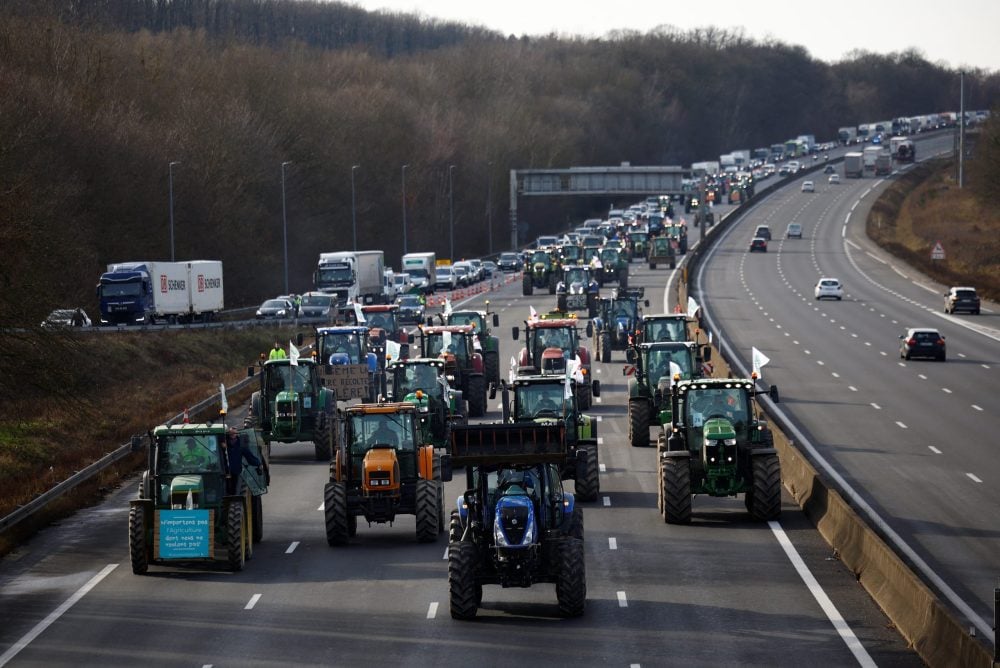Belgian farmers block roads to Zeebrugge port as French protests spill over

Brussels/Madrid | Reuters — Belgian farmers angry about rising costs, EU environmental policies and cheap food imports blocked access roads to the Zeebrugge container port on Tuesday.
Farmers organizing the protest told Reuters they planned to bar access to the North Sea port, the country’s second-largest, for at least 36 hours. They said the port was targeted because they feel it receives economic support at the expense of farmers.
A port authority spokesman said protesters had blocked five roads to trucks, but were letting cars through. He said it was not yet clear what the consequences on the operations of the port would be, and the port was indirectly in touch with the organizers through the police.
Read Also

Angry French farmers block highways in bid to step up pressure on government
Long lines of tractors blocked highways near Paris and across France on Monday, as angry farmers sought to put pressure on the government to do more to help them weather inflation, compete with cheap imports and make a living.
The Algemeen Boerensyndicaat (ABS, General Farmers Syndicate) union has called on its members to join the protest.
“The farmers are desperate, really desperate. We’ve warned the government for years that this would happen,” ABS policy officer Mark Wulfrancke said.
Wulfrancke urged policymakers to ensure the price of food reflects the additional costs European farmers face to comply with Europe’s rising environmental standards.
“We want respect from our government, the European government. The only way to show that respect is to make a policy that is farmer friendly, food friendly. We need a correct price,” he told Reuters.
The Belgian protest movement has been boosted by similar action in France, where farmers have set up dozens of roadblocks and disrupted traffic around Paris, putting the government under pressure.
Belgian farmers also disrupted traffic during the morning rush hour on Tuesday. One of the blockades was close to the Dutch border on the E19 highway, media said.
Prime Minister Alexander De Croo is set to meet with farmers’ associations on Tuesday.
“It is important that they are listened to,” De Croo told reporters, referring to the challenges farmers face.
He said Belgium, which currently holds the six-month presidency of the Council of the EU, will discuss a number of European agricultural rules with the European Commission.
A group of farmers blocking a square in central Brussels with tractors said they would stay put until at least Thursday, when EU government leaders meet in the city.
“We are asking them to review their laws,” said Nicolas Fryers, a farmer at the protest. “They talk about being greener but if that happens then there will be land which isn’t worked any more and it’s difficult enough as it is.”
The European Commission appeared poised to offer some policy changes in response, by proposing an exemption on Thursday on rules requiring farmers to leave part of their land fallow if they apply for EU subsidies.
The rules on fallow land were part of the grievances that led to protests in France and elsewhere in recent weeks.
Spanish farmers plan protest
Spanish farmers’ associations said on Tuesday they were planning to take to the streets in February in protest against strict European regulations and lack of government support.
“Mobilizations will take place as soon as possible,” Pedro Barato, president of Asaja, a Spanish association representing around 200,000 farmers and cattle breeders, said in a radio interview. “The actions will not be very different from what is happening in other EU countries.”
The protests are set to take place in the coming weeks, the organizations said in a joint statement. Asaja members are due to meet on Feb. 1 to make preparations.
Drought in southern Spain has hit farmers, with production of several crops such as rice and olives dropping over the past two years.
The largest farmers’ groups in Spain – Asaja, COAG and UPA – also share the same as grievances as their peers in other European countries, claiming environmental regulations imposed by Brussels are undermining the profitability of crops and increasing food prices.
Spanish farmers said they were also struggling to compete with products imported from outside the EU at lower prices.
As the French protests have intensified, some 20,000 Spanish trucks that cross the border every day have struggled to transport fruit, vegetables and other goods. Spanish transport association, Fenadismer, estimates the blockades cause daily losses of 10 million euros (CAD $14.6 million) for Spanish companies.
Among other demands, the Spanish organizations plan to ask Brussels to halt negotiations with the Mercosur trade bloc, as well as trade agreements with Chile, Kenya, Mexico, India and Australia.
“It is time for them (European and national authorities) to take note, rectify and reform their strategies,” Asaja said.
–Reporting for Reuters by Corina Pons, Emma Pinedo, Tassilo Hummel, Geert De Clercq and Kate Abnett.
Source: Farmtario.com

